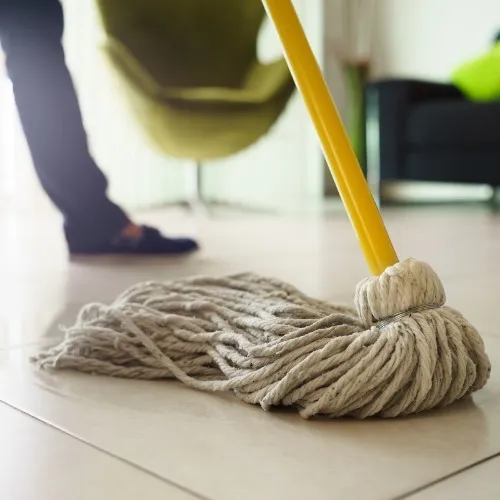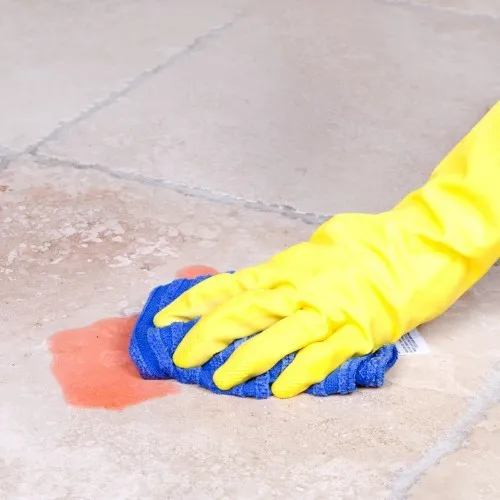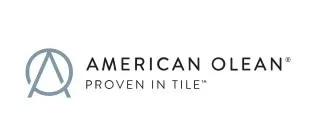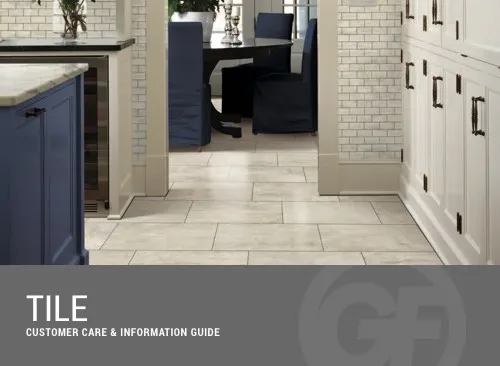Natural Stone & Ceramic Tile Care & Maintenance
With proper maintenance & the appropriate cleaners, your timeless natural stone and ceramic tile floors can easily remain stunning for decades.
Care & Maintenance Tips For Different Tile & Stone Types
Use these valuable tips for caring for your specific ceramic tile and natural stone types:
Glazed Ceramic Tile – After ensuring that any grout is sealed, start by sweeping or vacuuming your glazed ceramic tile. You can wash as needed with a diluted solution of a tile cleaner, making sure to rinse thoroughly, and wipe dry once complete. For more heavy-duty cleaning, use a commercial tile cleaner or a more concentrated solution, apply vigorously with a scrub brush, rinse thoroughly, and finish by wiping dry with a clean, soft cloth or sponge.
Non-Polished Porcelain Tile – Since these tiles can sometimes prove difficult to keep clean as a result of their porous surface, we recommend using a marble cleaner to maintain your surface and following the cleaner guidelines closely.

Marble – Use a marble cleaner to regularly maintain your surface, remove soils and commitments, and follow the cleaner guidelines closely. Due to the softness of marble, susceptibility to stains, and potential of acidic damage or etching from food, alcohol, or cleaners, we recommend either professional resurfacing if needed or applying a stone sealer. A stone sealer will help prevent staining and etching to honed and unpolished marble surfaces.
Granite – Since granite can stain easily due to small fissures between quartz crystals, we highly recommend using a stone sealer to protect it from absorbing water and oil. Otherwise, maintain your granite surfaces by using a marble cleaner regularly.
Limestone – Since limestone surfaces are both highly absorbent and susceptible to staining, we recommend using a stone sealer to lower absorbency and prevent deep stains. Otherwise, maintain your limestone surfaces by using a marble cleaner regularly.
Slate – Since some slates absorb stains or show foot traffic over time, we recommend protecting your surfaces with a stone sealer to preserve your slate's natural appearance. If you desire a glossy appearance, you can use a sealer with additives that provide lasting protection from abrasion. Follow this up with a marble polish and avoid other cleaning agents that can strip or damage the finish.

Grout & Sealer Guidelines For Stone & Tile Flooring
If you tile surfaces have visible grout lines, don’t be alarmed if you notice slight discoloration in cementitious grout. Since cement-based grout joints will absorb water, oil, and food stains that can't be prevented with latex additives, then you may see shading variations occur after installation. Also, grout can appear darker around sinks where water is present or stove cook tops where oil and grease spatters are common.
You can use a grout sealer to minimize damage to sanded grout joints, but your grout must cure for 30 days before applying sealer. Topical sealers will become a barrier on the surface and may give a light gloss, while sub-surface sealers penetrate the grout and leave behind a natural surface appearance. Many newer grout technologies do not require sealing, so simply refer to the manufacturer's recommendations for maintenance guidelines.
Use a stone sealer for showers and other wet areas, and make sure to properly caulk the area to prevent water damage. Determine which type of sealer is the best option for your stone:
- Solvent-Based Impregnator Sealers – These wipe-on, wipe-off products offer stain protection for natural interior and exterior stone and can also be used on grout.
- Water-Based Porous Stone Protectors – These wipe-on, wipe-off products offer stain protection for porous natural stones such as limestone, travertine, slate, or concrete, and can also be used on grout.
- Grout Sealer – These products are generally used for glazed tile that doesn't require sealing, applied with a small brush, and offer stain protection for grout.
Special Tips for Stone & Tile Bathrooms
In addition to constant activity and moisture that our bathrooms must withstand, these spaces will experience residue from soap and shampoo over time. Rather than let these oils build up on your tile surfaces, try to wipe down the shower walls with a soft rubber squeegee or towel regularly. By eliminating the build-up of soap scum or hard water film, you will better prevent the growth of mildew as well. If possible, use liquid body wash over bar soap since these products will adhere less to bathroom tile. Wipe your tile bathroom vanity tops, walls, and floors with a damp sponge or cloth regularly to preserve a bright, shining appeal!
We Carry The Top Tile Brands In The Northwest






Ready to get your project started?
Fill out the form below and we'll reach out to you shortly.
"*" indicates required fields

